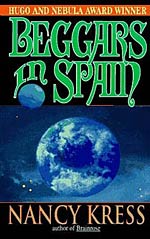
![]() couchtomoon
couchtomoon
6/12/2014
![]()
Let's say a genie grants me three wishes. Obviously, I would spend my first two wishes on world peace and a comfortable retirement in Europe. But my third wish would be for more hours in a day, just because I can never fit in everything I want to do.
Nancy Kress must share that last sentiment, because her Hugo award-winning novella, "Beggars in Spain," and her subsequent novel of the same name, is an exploration of society in which parents can choose to endow their children with more time and productivity. They do this, however, by genetically modifying their children to never need sleep.
Before she was born, Leisha Camden's life was already determined for her. Her parents purchased genetic modifications to make her beautiful, intelligent, and to never require sleep, while her unexpected twin sister received none of these traits. Being Sleepless provides Leisha with more time to devote to studies and contribute to society, but it also causes resentment and distrust among the Sleeper majority, and tensions between the two communities boil over into violence, segregation, and systematic oppression. Leisha is one of the few Sleepless who chooses to remain living among the Sleepers, and workstirelessly to improve relations. But when an influential Sleepless is murdered in jail, the Sleepless make plans to leave Earth, and ostracize Leisha from their community. Defeated, Leisha finds herself alone among Sleepers, and a stranger within her own family.
Oh, and one other thing. Nobody goes to Spain. This is not a cultural fiction novel that will have your mouth watering for tapas.
Despite the premise's reliance on genetic science, Beggars in Spain is best classified as sociological SF, in the vein of Octavia Butler, where the social impact of biological tweaks in humanity are explored. Less personal than Butler, Kress keeps her characters at arms-length—they're fully-fleshed, yet unemotional, but that fits with Kress' world of the mid- to late-21st century in the United States. The science is still there, with the first chapters occupied with realistic-sounding explanations about raphe nuclei and neurotransmitters, but it's done smoothly and efficiently, and is quickly dumped for the actual meat of the story. Kress focuses her talent on the development of an evolving, pulsing society, driven by pseudo-economics self-help messages, divisive intolerance, and a decadent lower class. This is what true speculative fiction should be: a thought experiment based upon a change, and a speculation of the impact of that change from all angles of society, as demonstrated through the characters' varying perspectives. Kress does this very, very well.
Just as fascinating as the Sleeplessness, an undercurrent of economic philosophy drives the plot, where Yagaism, a pop-economic theory that sounds more appropriate for a self-help book, rather than a peer-reviewed journal, molds the global economy into a meritocracy based on individual determinism. That sounds exactly like our current economic system, sure, yet in Yagaism, the value of work ethic outweighs the value of the dollar. The brain is the means of production, and leisure is the enemy.
Yagaism sounds a bit like Rousseau's social contract, subverted by Ayn Rand-ian economic egoism." ...a man's worth to society and to himself doesn't rest on what he thinks other people should do or be or feel, but on himself. On what he can actually do, and do well. People trade what they do well, and everyone benefits. The basic tool of civilization is the contract. Contracts are voluntary and mutually beneficial. As opposed to coercion, which is wrong" (p. 29). It's almost a blend of American ambition with a mystic belief that all people will prosper if the best get better (and richer). Like a psychic form of Reagan's trickledown economics (and we all know how that worked out).
So, what the hell does this have to do with the beggars in Spain? The Sleepless call the Sleepers "Beggars," a derogatory name inspired by their murdered friend, whose analogy about going to Spain and giving a dollar to one beggar versus giving a dollar to one hundred beggars becomes the Sleepless' mantra to help only themselves, because the futility of helping one beggar neglects hundreds of other beggars, and helping all of the beggars is too overwhelming, and drags down society. But the philosophy cannibalizes itself, when the Sanctuary community quickly euthanizes any person with questionable medical problems, and aborts any fetuses that indicate Sleeper brain patterns, because "no one has a right to make claims on the strong and productive because he is weak and useless. To set a higher value on weakness than on ability is morally obscene" (p. 364). With those beliefs, paranoia infects the dwindling Sleepless community.
Yagaism, beggarism... it all sounds like fuzzy logic, but Kress explores each tangle through her diverse and complex characters. The economic arguments are too complex to be a straightforward capitalism vs. communism caricature. Even Kress's characters' opinions change throughout their lives, which makes it difficult identify Kress's own views within the knotted philosophical turmoil of Leisha and her friends. Liberal sensibilities might bristle at Leisha's Yagaist messages, which sometimes sound like an assortment of Rand Paul election ads, but Leisha evolves, as does Yagaism.
But it's not all philosophical pontificating! The story itself is interesting and well-plotted, with a great assortment of sterile, yet intriguing, characters. The first novella about Leisha's childhood blows away the following chapters, but it's still a worthwhile read. I hear the later books drag, but Kress' final chapter sets up the sequel, Beggars and Choosers(1994), in a tantalizing way.
*Yawn* As much as I desire extra hours in a day, I think I would miss the pleasure of sleep. Even the Sleepless characters in Beggars discover the importance of rest and dreaming for their mental health. It's past my bedtime, folks!
http://couchtomoon.wordpress.com